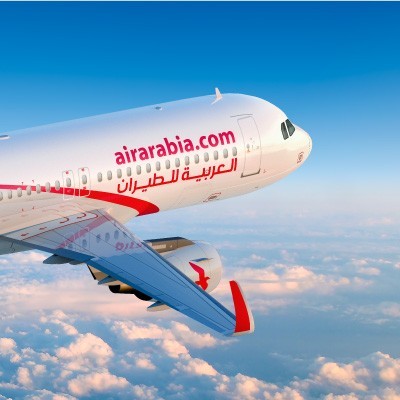Air Arabia recorded net profits of AED 656 million (approximately $178.6 million) in the third quarter of this year, an increase of 16 percent compared to the same period last year, while revenues during the same period increased by 14 percent to reach AED 2.04 billion (approximately $560 million), reflecting the company’s performance and continued demand for its services.
The company carried more than 5.9 million passengers on its fleet between July and September 2025 across all its operational hubs, a 16 percent increase over last year, while the seat occupancy rate (the ratio of the number of passengers to the number of available seats) increased by 4 percent to reach 85 percent.
Sheikh Abdullah bin Mohammed Al Thani, Chairman of Air Arabia, said: “The company’s strong performance in the third quarter reflects the effectiveness of our business model and the continued increase in demand for our services. The growth in profitability, revenues and passenger numbers confirms our ability to continue to achieve strong results despite the geopolitical repercussions of the region and the ongoing supply chain challenges facing the aviation sector.”
He added: “Through our continued focus on operational efficiency, our effective approach to cost control, and our investment in developing our network of destinations, we have been able to maintain strong profit margins and enter new key markets. These results reflect the efficiency of our management team, the confidence of our customers, and the strength of our strategic vision.”
He concluded his statement by saying: “As we enter the final quarter of the year, our focus remains primarily on strengthening our long-term growth strategy and sustainable performance that delivers ongoing value to our shareholders. We will continue to expand our network of destinations and enhance the customer experience through innovation, operational efficiency, and corporate excellence.”
Strong performance during the first nine months of 2025
Air Arabia continued to deliver strong performance during the first nine months of this year (January to September), driven by sustained demand and efficient operations. The company recorded net profits of AED 1.42 billion, an increase of 13 percent compared to the same period last year, while revenues for the first nine months increased by 10 percent to reach AED 5.49 billion. The number of passengers during this period also increased to more than 16 million passengers, an increase of 14 percent, along with a seat occupancy rate of 85 percent.
During the first nine months of the year, it added 12 new destinations to its global network from its operational hubs in the UAE, Morocco, Egypt and Pakistan, bringing the total size of its network to 212 destinations.
The company added 6 new aircraft to its fleet during the same period, bringing the total number of owned and leased aircraft to 88 Airbus A320 and A321 models, with more aircraft scheduled to be added to the fleet before the end of 2025.
In July, the Saudi General Authority of Civil Aviation selected a consortium led by Air Arabia, Nesma Group and Ken to establish and operate a new national air carrier based at King Fahd International Airport in Dammam.
Air Arabia was ranked among the top 20 low-cost carriers for 2025 by AirlineRatings.com and also won the Best Low-Cost Airline of the Year award at the TDM Travel Excellence Awards - Middle East. The company was also ranked among the top 100 publicly traded companies in the Middle East for 2025 by Forbes Middle East, and Air Arabia Group CEO Adel Al Ali was included in Arabian Business magazine's list of the 150 most influential Arabs for 2025. FlyJinah, the Air Arabia Group's joint venture in Pakistan, was ranked second in terms of on-time performance according to the Pakistan Civil Aviation Authority (PCAA).
During the third quarter of 2025, Air Arabia maintained its ranking among the leaders in the aviation sector according to the Morgan Stanley Capital International Environmental, Social and Governance (ESG) Index, achieving a new AA rating. As part of its sustainability strategy, the company conducted an assessment of core issues involving more than 400 stakeholders and identified 12 key sustainability priorities.
The company also received its first Airbus A320neo aircraft as part of an order for 120 aircraft, which provide a reduction in fuel consumption and carbon dioxide emissions of up to 20 percent. The company supports these efforts with ongoing fuel-saving initiatives, a digital program for managing flight data without the use of paper documents, and continued digital transformation across all operational processes.
Sahab Al Khair continued its sustainable social responsibility program by opening two new clinics in Bangladesh and Egypt, providing basic healthcare services to communities in need. This brings the total number of Sahab Al Khair schools and clinics to 15, spread across 12 countries, reflecting the company’s ongoing commitment to social development and community well-being.






































